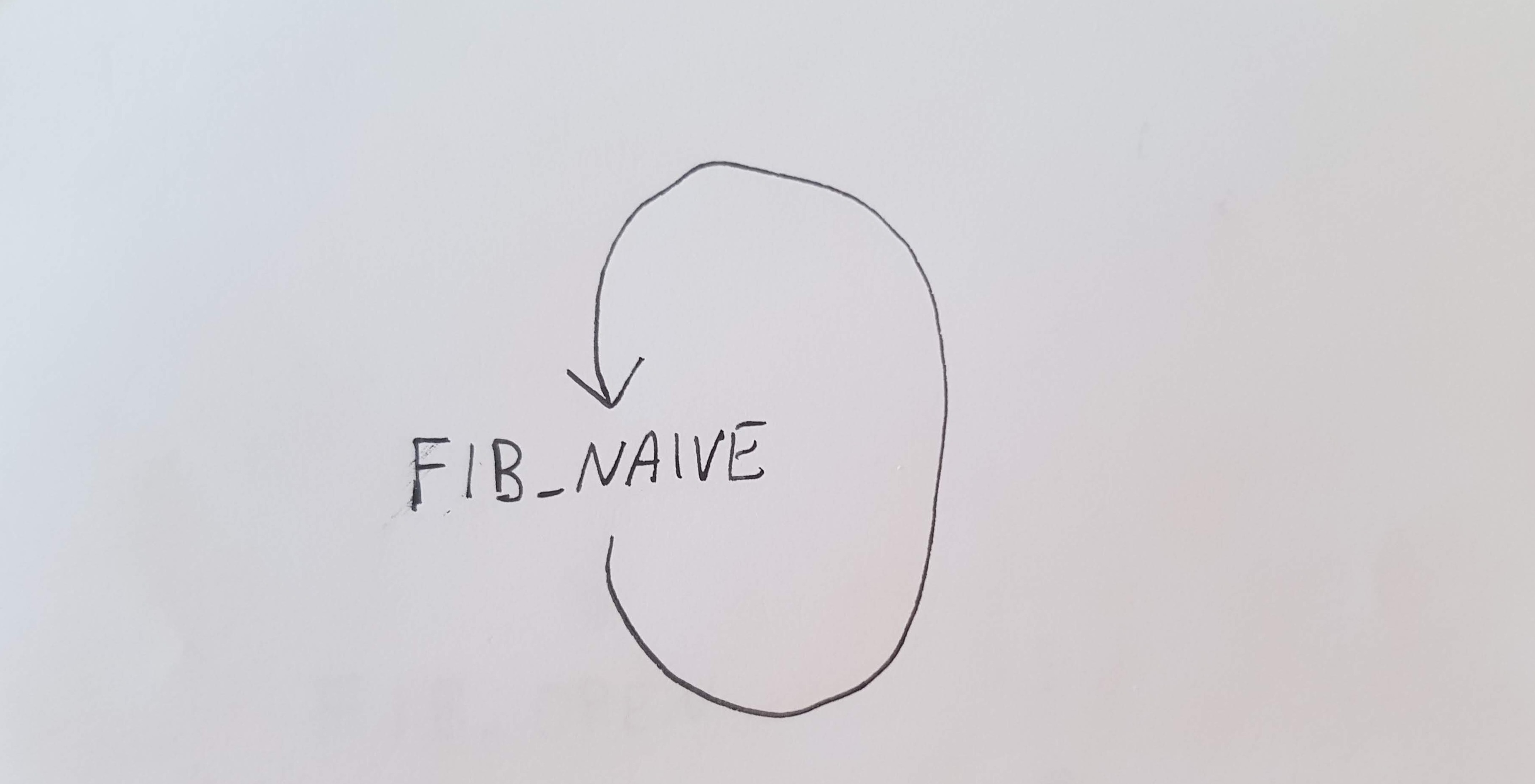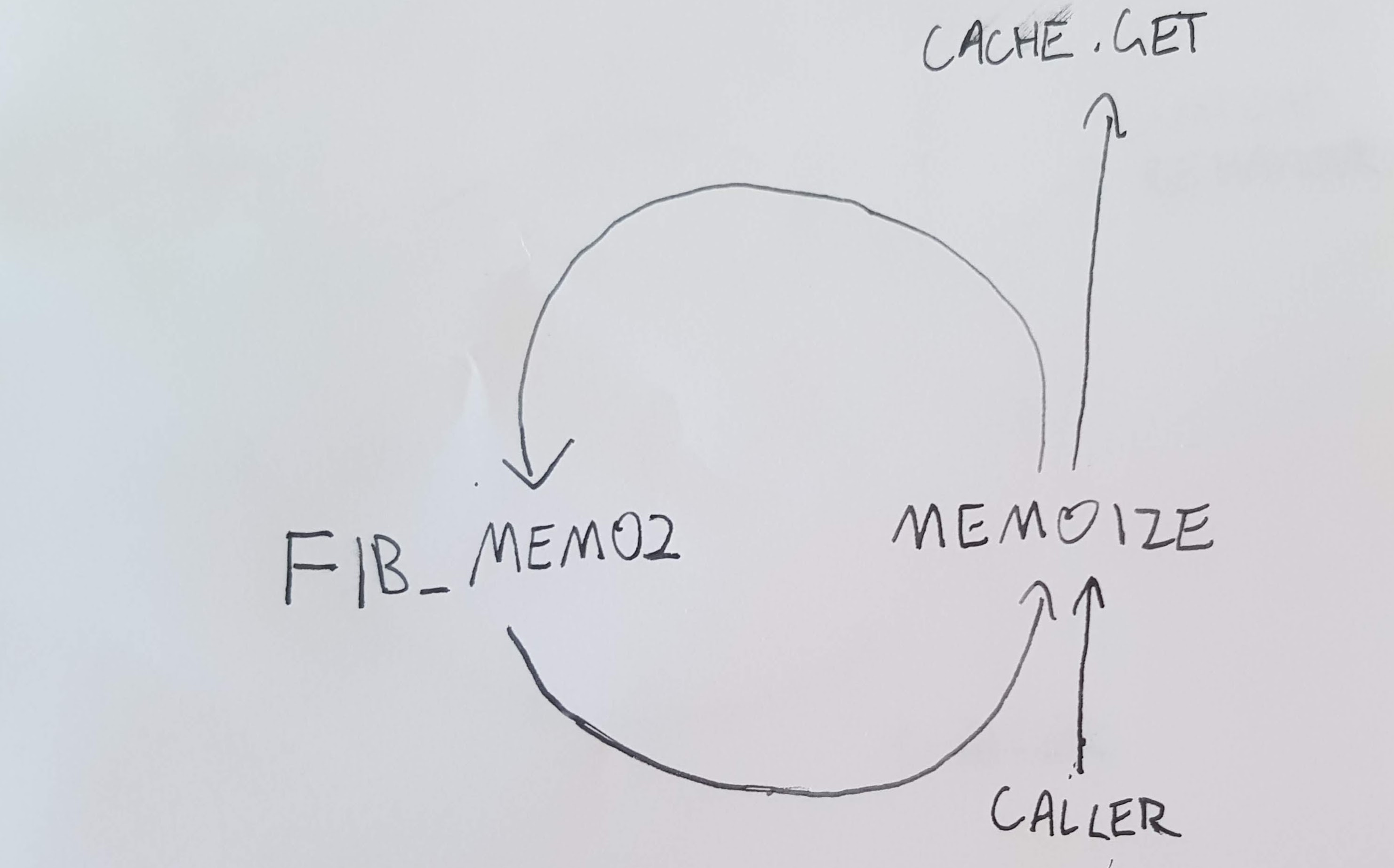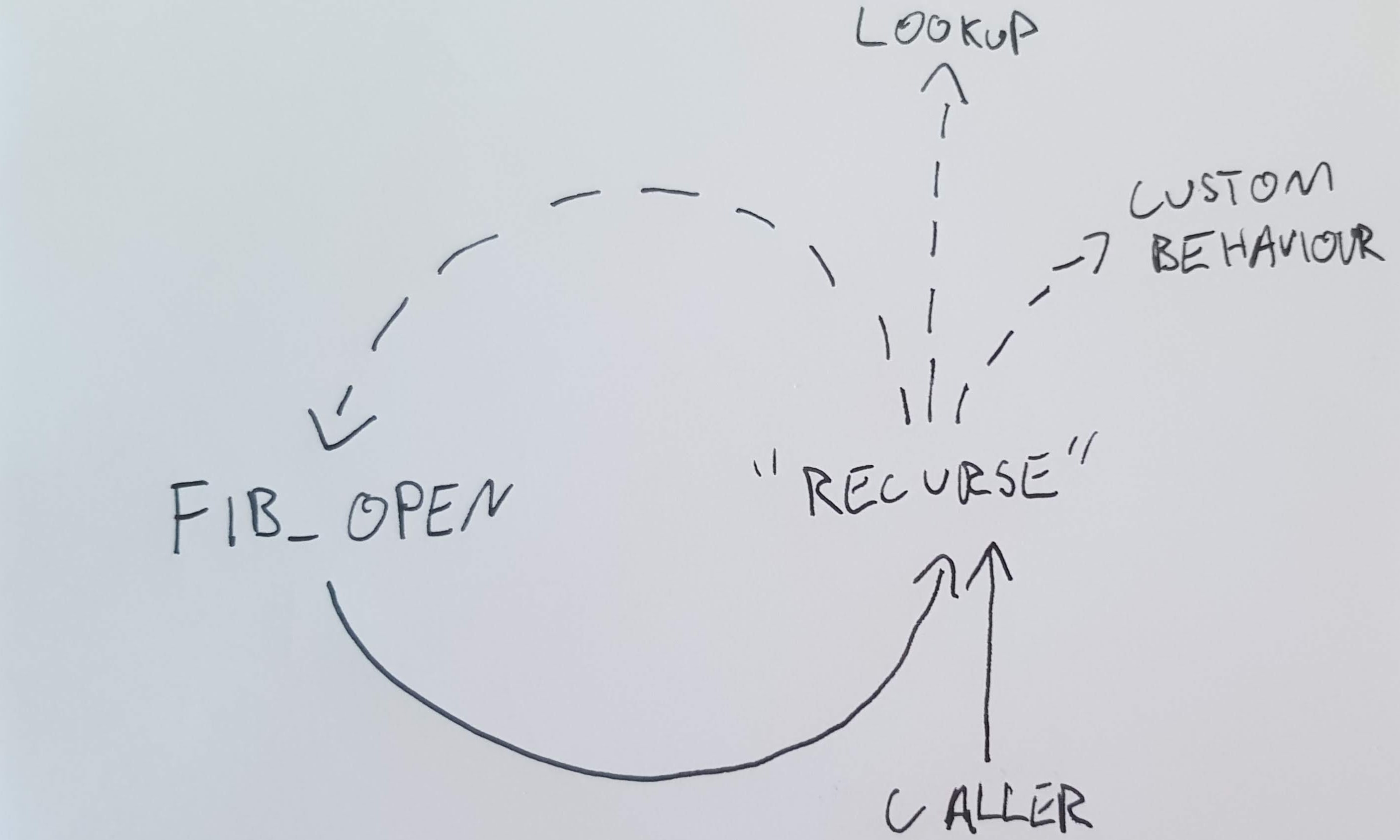Sumary:
Using “open” recursion:
- We can separate memoization logic from function logic.
- We can memoize functions without modifying the syntax of the function.
- We can make functions generic across multiple types of memoization.
Memoization in Rust.
Consider a recursive function. The most basic example is the Fibonacci sequence. Here is a naive implementation:
fn fib_naive(arg: u32) -> u32 {
match arg {
0 => 0,
1 => 1,
n => fib_naive(n - 1) + fib_naive(n - 2),
}
}
fn main() {
assert_eq!(fib_naive(40), 102334155);
}

Calculating fib_naive(40) on my computer takes almost a second. If we look at this function, we can reason about it’s performance. The result of fib_naive is going to be 0, 1 or the result of two calls to fib_naive added together. If we only have 0, 1, and addition at our disposal, then it will take at least fib_naive(n) additions to calculate fib_naive(n). This is unacceptable performance for anything but the smallest values of n.
Memoizing the results
One way to improve performance is to memoize the results. That means that when we call our function, we record what the result is in some kind of cache. If we need to call the function again with the same arguments, instead of calculating the result, we look the result up in the cache.
The algorithm is a simple modification to the function above: whenever we call our function, we check if the result is already in the cache, if it’s already there, we return it. If it’s not there, we calculate it, save the result in the cache, and return the value:
fn fib_memo (cache: &mut HashMap<u32, u32>, arg: u32) -> u32 {
match cache.get(&arg).map(|entry| entry.clone()) {
Some(result) => result,
None => {
let result = match arg {
0 => 0,
1 => 1,
n => fib_memo(cache, n - 1) + fib_memo(cache, n - 2),
};
cache.insert(arg, result.clone());
result
}
}
}
fn main () {
assert_eq!(fib_memo(&mut HashMap::new(), 40), 102334155);
}
This is still reasonably straightforward, there’s nothing overly complicated, and the performance of this function is a drastic improvement over fib_naive. Note that the original function body is still there in the None arm of the match statement. We also have to call the function using an extra argument: &mut HashMap::new().
We can do better. The memoization logic is not specific to fib_memo. We can put the memoization logic in a separate function so we can use it for other functions later:
fn memoize<A, R, F> (cache: &mut HashMap<A, R>, func: F, arg: A) -> R where
A: Eq + Hash + Clone,
R: Clone,
F: Fn(&mut HashMap<A, R>, A) -> R
{
match cache.get(&arg).map(|x| x.clone()) {
Some(result) => result,
None => {
let result = func(cache, arg.clone());
cache.insert(arg, result.clone());
result
}
}
}
This function allows us to rewrite our fib_memo function:
fn fib_memo2 (cache: &mut HashMap<u32, u32>, arg: u32) -> u32 {
match arg {
0 => 0,
1 => 1,
n => memoize(cache, fib_memo2, n - 1) +
memoize(cache, fib_memo2, arg - 2),
}
}
fn main() {
assert_eq!(memoize(&mut HashMap::new(), fib_memo2, 40), 102334155);
}

Now we can use memoize for any function without having to write it down all the time. This code still has some issues which we will attempt to solve:
First of all, we could pass the wrong cache to memoize. It could be a cache from another function, or it could have been modified by something else to contain incorrect values. The cache and the function are linked together, and should be a single unit.
Secondly, it’s inconvenient to always have to call fib_memo2 through the memoize function. Users of this function may become frustrated that we can’t call it directly.
Thirdly, we can’t change the type of memoization. If we want to call this function without memoization, we have to rewrite it. We’ll talk about how to resolve this later.
Introducing open recursion
Disclaimer: the following currently only works on Rust nightly.
First of all, we put the cache and the function together in a single struct so that we can’t accidentally use the wrong cache with our function. We also create a constructor so that we can make a HashCache from a function:
struct HashCache <A, R> {
data: HashMap<A, R>,
func: fn(&mut HashCache<A, R>, A) -> R,
}
impl<A, R> HashCache<A, R> where
A: Eq + Hash
{
fn from_func(func: fn(&mut Self, A) -> R) -> Self {
HashCache {
data: HashMap::new(),
func: func,
}
}
}
The signature of func is very similar to the signature of fib_memo, but instead of a HashMap as a cache, we have our own HashCache.
Next, let’s implement FnMut for HashCache:
impl<A, R> FnMut<(A,)> for HashCache<A, R> where
A: Eq + Hash + Clone,
R: Clone,
{
extern "rust-call" fn call_mut(&mut self, args: (A,)) -> Self::Output {
let arg = args.0;
match self.data.get(&arg).map(|x| x.clone()) {
Some(result) => result,
None => {
let result = (self.func.clone())(self, arg.clone());
self.data.insert(arg, result.clone());
result
}
}
}
}
// We need to implement `FnOnce` to implement `FnMut`.
impl<A, R> FnOnce<(A,)> for HashCache<A, R> where
A: Eq + Hash + Clone,
R: Clone,
{
type Output = R;
extern "rust-call" fn call_once(mut self, args: (A,)) -> Self::Output {
self.call_mut(args)
}
}
Apart from some minor implementation details, the code for call_mut is the same as the code for memoize. Some key points are:
- We can call a
HashCachestruct like a regular function because it implementsFnMut. - When we call
HashCachelike a function, it contains a cache and a function pointer already, so the only extra information we need is the argument tofib_xxx.
Next, let’s rewrite our function to use open recursion:
fn fib_open<F>(recurse: &mut F, arg: u32) -> u32 where
F: FnMut(u32) -> u32
{
match arg {
0 => 0,
1 => 1,
n => recurse(n - 1) + recurse(n - 2),
}
}
This is similar to what our original fib_naive looked like. The difference is that where fib_open calls itself by name, we call the recurse function.
fib_open also has similarities to fib_memo2, instead of the cache argument, we have an &mut F called recurse, and instead of calling memoize, we call recurse.
HashCache<u32, u32> implements FnMut(u32) -> u32, so it is a suitable value for recurse. We can also call it as a standalone function:
fn main() {
let mut memoised = HashCache::from_func(fib_open);
assert_eq!(memoised(40), 102334155);
}

Swapping out recursive methods:
We discussed not having to rewrite the function if we want to use regular recursion. We can create a newtype wrapper around an open recursive function:
struct NoCache<A, R>(fn(&mut NoCache<A, R>, A) -> R);
Unlike the HashCache struct, since we are not memoizing anything, we don’t have to store the cache, just the function pointer. We can implement FnMut for NoCache:
impl<A, R> FnMut<(A,)> for NoCache<A, R>
{
extern "rust-call" fn call_mut(&mut self, args: (A,)) -> Self::Output {
(self.0.clone())(self, args.0)
}
}
impl<A, R> FnOnce<(A,)> for NoCache<A, R>
{
type Output = R;
extern "rust-call" fn call_once(mut self, args: (A,)) -> Self::Output {
self.call_mut(args)
}
}
Similar to HashCache, NoCache is a suitable value for recurse, so we can both feed it to fib_open and to call it by itself:
fn main() {
let mut regular = NoCache(fib_open);
assert_eq!(regular(40), 102334155);
}
In conclusion we manage to solve all three of our original problems:
- Using
HashCache, we can’t mix up a function and it’s respective cache. - We can call memoized function using regular function call syntax.
- We can swap out memoization with regular recursion without modifying the function itself.
rust
memoization
recursion
performance
continuations